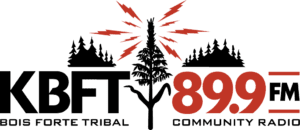Crystalyne Curley, Speaker of the Navajo Nation Council, addresses a reception hosted by the Navajo Nation at the Navajo Nation Washington Office in Washington, D.C., on January 19, 2025. Photo by Indianz.Com (CC BY-NC-SA 4.0)
WÁSHINDOON — Leaders of some of the largest tribal nations in the country are remaining optimistic and hopeful as Donald Trump becomes the 47th president of the United States.
During the 2024 presidential campaign, Trump did not focus much on Indian Country.
That stood in contrast to Kamala Harris, the Democratic candidate for president, who racked up numerous tribal endorsements as she sought to continue and build upon the achievements secured during the administration of Joe Biden.
But at a reception in the nation’s capital on Sunday evening, copies of the Navajo Treaty of 1868 underscored the work that lies ahead as tribes hold the U.S. government accountable for the promises made to American Indians and Alaska Natives. No matter who occupies the White House, the trust and treaty relationship must be honored, tribal leaders said.
“We’re all here tonight to really figure out how do we come together to make sure that we bring opportunities like economic development, jobs and revenues for the nations that we represent — and particularly the Navajo Nation,” said Navajo Nation President Buu Nygren.
“I’m honored that I’m looking forward to working with the new incoming administration,” Nygren said at the Navajo Nation Washington Office, located in a building less than a mile from the U.S. Capitol where Trump takes the oath of office at mid-day on Monday.
From left: Justin Ahasteen, Executive Director of the Navajo Nation Washington Office, and Rep. Eli Crane (R-Arizona) in Washington, D.C., on January 19, 2025. Photo by Indianz.Com (CC BY-NC-SA 4.0)
According to Navajo leaders, Indian Country stands to benefit from Trump’s efforts to streamline government operations. They said reducing bureaucratic hurdles at the Department of the Interior and other federal agencies will help further the nation-to-nation relationship between individual tribes and the United States.
“You know, sometimes we’re bombarded as tribal nations: ‘You can’t do this, you can’t do that,’” Speaker Crystalyne Curley of the Navajo Nation Council observed.
“It’s one thing to recognize tribal sovereignty but what does it mean to be a nation within a nation?” said Curley, who is the first woman to lead her tribe’s legislative branch. She answered the question: “Nation-building, being able to stand on our own two feet.”
“So there’s a lot of big plans that we envision for this new administration,” Curley stressed, citing the restoration of tribal homelands as a key priority.
Chairman J. Garrett Renville of the Sisseton Wahpeton Oyate expressed similar sentiments of hope. As a tribe with homelands in North Dakota and South Dakota, his people already have a strong connection with a key member of the Trump cabinet: Doug Burgum, who has been tapped to be Secretary of the Interior
Renville noted that his tribe met regularly with Burgum during the eight years he served as governor of North Dakota. So he said the Interior pick has an understanding of the issues facing tribes with large land bases, whether its public safety or health care.
“I’m excited that he’s coming into the Interior,” Renville said of Burgum, whose confirmation hearing last Thursday saw him earn praise from Republican and Democratic lawmakers alike.
“I’m excited because of that — Doug Burgum is a real smart guy,” added Renville, who also serves as chair of the Coalition of Large Tribes (COLT), along with Curley as vice chair of the inter-tribal organization.
J. Garrett Renville, left, Chairman of the Sisseton-Wahpeton Oyate and the Coalition of Large Tribes, presents an honor to Billy Kirkland on behalf of COLT at a reception hosted by the Navajo Nation at the Navajo Nation Washington Office in Washington, D.C., on January 19, 2025. Photo by Indianz.Com (CC BY-NC-SA 4.0)
As tribes navigate the new administration, some allies are promising to provide support. Rep. Eli Crane (R-Arizona), whose district in Arizona includes parts of the Navajo Nation, said educating officials about Indian Country’s unique needs is a crucial part of the federal-tribal relationship.
“I do have a lot of confidence that we’re going to be able to really get some great things done with this administration,” Crane told the crowd at the Navajo Nation Washington Office.
Myron Lizer, a Republican and former vice president of the Navajo Nation, offered his help as well, although in what shape and form is among the changes afoot in Washington, D.C. He has made no secret of his desire to serve as Assistant Secretary for Indian Affairs, a political position at Interior that oversees the Bureau of Indian Affairs, the Bureau of Indian Education and the Bureau of Trust Funds Administration.
“We need to make government more efficient for the Indian Country — and this is the time, this is the time,” said Lizer.
“And so I challenge you all, if you haven’t already warmed up to this new narrative that’s happening here in D.C., I think this is our time, this is our time,” he said.
At least three tribal citizens who served in the first Trump administration were in attendance at the reception. They included John Tahsuda, a citizen of the Kiowa Tribe who worked at Interior; Gavin Clarkson, a citizen of the Choctaw Nation who also was at Interior; and Billy Kirkland, a citizen of the Navajo Nation who worked at the White House.
Robert Flat Lip, an elder from the Crow Tribe, displays a headdress his adoptive father wore to the 1961 inauguration of President John F. Kennedy at a reception hosted by the by the Navajo Nation at the Navajo Nation Washington Office in Washington, D.C., on January 19, 2025. Photo by Indianz.Com (CC BY-NC-SA 4.0)
According to attendees and tribal leaders, Kirkland has already been playing a key role in getting Indian Country a seat at the table amid the change in power in D.C. Thanks to his efforts, Robert Flat Lip, an elder from the Crow Tribe, is expected to be one of the few dignitaries witnessing the presidential inauguration in person now that it has been moved indoors to the U.S. Capitol due to extreme weather conditions.
“Anytime we can get Indian Country more involved, whether it’s here in Washington, or in the states,” Kirkland said as he was honored by COLT at the reception, “we definitely want to do so.”
“I know the White House will continue to have an open door policy with all the tribal nations,” said Kirkland.


